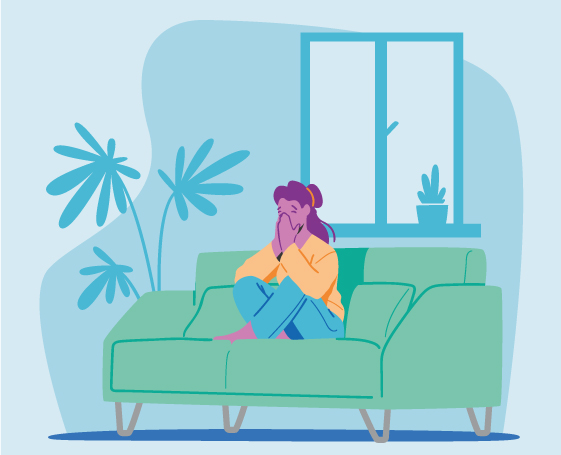
5 minute read
Supalonely?
Kiwi artist Benee gained overnight international fame when her song ‘Supalonely’ gained 6.9 billion plays on TikTok during the month of March 2020. Music commentators credit the success of Supalonely to the timing of its release in December 2019, which coincided with the beginning of global pandemic lockdowns. Many resonated with the song’s themes, especially teenagers and young adults. Jules Badger delves into the rapid rise of loneliness in the 21st century.
While there’s a lot we can blame on the Covid-19 pandemic, loneliness is not technically one of them. But what the pandemic did do was expose and exacerbate what sociologists and other health professionals are calling an unprecedented ‘loneliness epidemic’ unique to this century. Last year the World Health Organisation (WHO) launched an international commission to investigate loneliness as a pressing global threat. Shockingly, health experts claim that loneliness increases our risk of mortality by as much as 30 percent. In other words, the impact of loneliness on our health is like smoking 15 cigarettes a day!
Expectations vs experience
So what is loneliness? In the February 2024 Internal Medicine Journal of America, author Isaac Ng defines loneliness as ‘a psychologically distressing perception of social isolation, which occurs when there is a mismatch between a person’s desired amount and quality of social interactions and relationships and the actual experience’.
And while loneliness is affecting people of all ages, ethnicities, gender and socio-economic groups, the numbers of young adults represented in studies is disproportionate and rising. Loneliness NZ (loneliness.org.nz) cites our highest rates of loneliness as being among youth aged 15 to 24 years. CEO for Loneliness NZ, Cathy Comer, echoes Isaac Ng when she states that ‘loneliness is about our expectation of what relationships we want and that expectation not being met, and it is a serious problem in New Zealand’.
Isaac pulls no punches when he states, ‘the recent exponential rise in digital and social media consumption has further changed the way people connect with one another, leading to increasingly superficial and inauthentic social relationships’.
We all know the science involved— the more ‘likes’ and ‘followers’, the greater the dopamine hit. We feel good in the moment but that doesn’t translate into deep relationships. Social media was designed to increase opportunities to connect with others, but it was never intended to be the source of meaningful relationships.
Individualism vs community
YouthLine counsellor Mahia Mokoraka tells it like it is: ‘The opposite of loneliness is community. Online interactions are no substitute for face-to-face connections.’
We may acknowledge that being alone does not necessarily mean you are lonely. Some of us are introverted by nature, while others choose solitude as a spiritual practice. But loneliness is a slippery little kipper! You can be in a huge crowd and still be plagued by feelings of loneliness. This is the great deception of modern individualism.
Michael Hempstead, TEDx speaker and author, attacks the issue directly when he says, ‘We prize individualism and say you shouldn’t have to depend on people or rely on others. But that goes fundamentally against our deepest human need which is to be loved and connected with others.’
Sociologists agree that the average human can sustain about 150 relationships. This is comprised of a small group (3–5) of intimates (family/spouse/BFF), a larger group (12–15) of confidants (extended family/home group/friend group), and a much wider ‘crowd’ (around 100) of acquaintances (work colleagues/sports or other club/wider congregation). However, the digital age is skewing these numbers with a false sense of community. Most of us today have hundreds of contacts in our phone and anywhere up to a thousand followers on social media, but these ‘friends’ are not the people we can call in a crisis.
Illusion vs reality
John Mark Comer, teaching pastor and author, says ‘the digital age has traded the illusion of connectivity for the reality of community’. He continues with ‘there are few things more radical and more difficult and more beautiful than Jesus’ vision of and call to community’.
What makes Christian community beautiful is our shared pursuit of intimacy with God. What makes Christian community difficult is our shared humanity. What makes it radical is our shared commitment to loving one another anyway. This is the kind of authentic community that helps dispel loneliness. But it’s only part of the cure. As Ecclesiastes 3 says, ‘God has set eternity in every heart…’
John Mark says, ‘Loneliness is the seed bed of all spirituality. It is the ache that drives you and I out of the prison of the self to search for God— ultimately the one who is looking for us.’ He goes on to say:In the core of our being, it turns out that what we all crave is not just friends to hang out with, not even a lover to be known and known by, or even a family, what we desire more than any other human or family no matter how intimate or healthy, is what ancient Christians call union with God. So loneliness is just part of what it means to be human. Welcome to the condition. And we can open it up and let it become our pathway to God. As the Persian Poet Hafez said, ‘Don’t surrender your loneliness so quickly. Let it cut you more deeply. Let it ferment. Something missing in my heart tonight has made my eyes so soft, my voice so tender, my need for God absolutely clear.
Perhaps being Supalonely isn’t so bad after all?
For more on community, listen to John Mark Comer’s teaching podcast Community | Unforced Rhythms of Grace, E5










